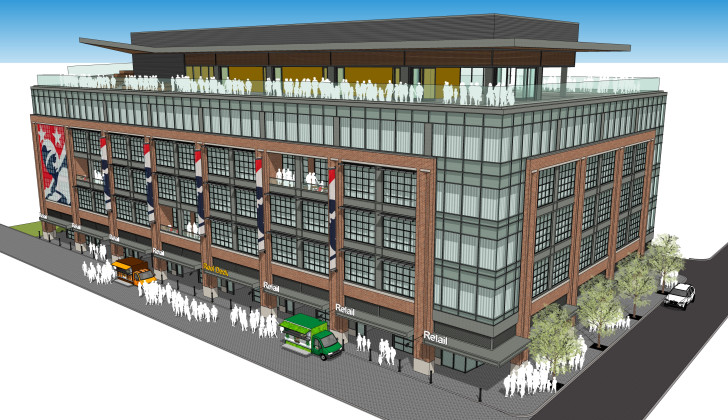City of Worcester to Expand Development Around PawSox Stadium
Wednesday, April 24, 2019
The City of Worcester announced on Wednesday that Madison Properties is expanding the scope of the project in the first phase of the development on the campus of the former Wyman-Gordan property. It is adjacent to the now being developed Worcester Red Sox stadium.“Since the announcement of the ballpark there has been strong interest in the surrounding development. In response to that interest, we’ve made changes and expanded the development of Phase 1,” said Denis Dowdle, President of Madison Properties.
The lot will now include a five-story office building in left field, a modification to the original Letter of Intent signed in August of 2018.
GET THE LATEST BREAKING NEWS HERE -- SIGN UP FOR GOLOCAL FREE DAILY EBLASTThe Modification
Under the modification, Madison Properties will construct an additional 5-story, 96,000 SF office building in left field.
The property will sit above an underground parking garage and include a roof deck and retail space overlooking the playing field.
“The unique and stately office building overlooking Polar Park’s left field will be a space unlike any other in baseball, and will provide a signature component of our project that aligns beautifully with our shared vision that this effort is about much more than a ballpark,” said PawSox Executive Vice President of Real Estate Development and Business Affairs Dan Rea.
The 110-room boutique hotel will move south of Madison St adjacent to a 140-room extended stay hotel, 225 apartments and 50,000 SF of retail split between the north and south side of Madison.
Original Plans
Under the original Letter of Intent (LOI) between the City and Madison Downtown Holdings, LLC, the developer agreed to a two-phase development project.
Phase 1 of the construction would include 225 market-rate apartments, a 150-room hotel, a second 110 room boutique hotel in left field and 65,000 SF of retail and restaurant space by early 2021.
Phase 2 of the project will include 200,000 SF of residential, office and/or mixed-use development.
Related Slideshow: Who Lost the PawSox? August 2018
Related Articles
- PawSox Sign Letter of Intent to Build a Triple-A Ballpark in Worcester
- Worcester Chamber Celebrates PawSox Move to Worcester
- Who Lost the PawSox?
- Guest MINDSETTER™ Girouard: We Can Only Blame Our Leaders for the Loss of the PawSox
- R.W. Alley: “PawSox, What Could Have Been”
- LIVE VIDEO: Worcester’s PawSox Press Conference
- Worcester to Make PawSox Announcement, Grebien Tells GoLocal Pawtucket Will Retain Team
- Central Falls, PawSox to Honor Baseball Hall of Famer Hemond
- PawSox Edge Closer to Worcester, What Will Be the Fallout in RI
- VIDEO: Pawtucket Councilman Vitali on PawSox Delegation City Hall Visit on Friday
- EDITORIAL: Will Fane’s $300M Investment Go the Way of the PawSox, Due to Lack of RI Leadership
- In Worcester — Questions Emerging to Cost of the PawSox Deal
- Worcester Hires Architectural Firm to Design New PawSox Stadium
- Worcester Launches Video Illustration of New PawSox Stadium
- Will Rhode Islanders Attend the PawSox’ Final Years?
- Gilbane Building Company & Hunt Named Construction Managers for New PawSox Stadium
- EDITORIAL: Hey, PawSox, Don’t Let the Turnstile Hit You On Your Way to Worcester
- Pawtucket Spent $273K in Legal, Consulting Fees for Construction of Failed PawSox Stadium














